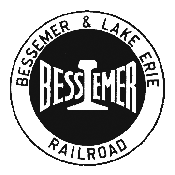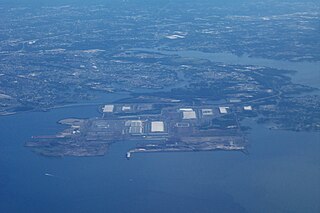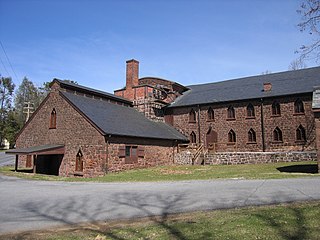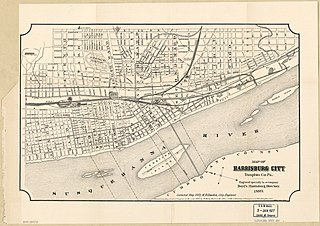
Steelton is a borough in Dauphin County, Pennsylvania, United States, 4 miles (6 km) southeast of Harrisburg. The population was 6,263 at the 2020 census. The borough is part of the Harrisburg–Carlisle Metropolitan Statistical Area.

The Bethlehem Steel Corporation was an American steelmaking company headquartered in Bethlehem, Pennsylvania. Until its closure in 2003, it was one of the world's largest steel-producing and shipbuilding companies. At the height of its success and productivity, the company was a symbol of American manufacturing leadership in the world, and its decline and ultimate liquidation in the late 20th century is similarly cited as an example of America's diminished manufacturing leadership. From its founding in 1857 through its 2003 dissolution, Bethlehem Steel's headquarters and primary steel mill manufacturing facilities were based in Bethlehem, Pennsylvania, in the Lehigh Valley region of the United States.

The Bessemer and Lake Erie Railroad is a class II railroad that operates in northwestern Pennsylvania and northeastern Ohio.

A steel mill or steelworks is an industrial plant for the manufacture of steel. It may be an integrated steel works carrying out all steps of steelmaking from smelting iron ore to rolled product, but may also be a plant where steel semi-finished casting products are made from molten pig iron or from scrap.

An ironworks or iron works is an industrial plant where iron is smelted and where heavy iron and steel products are made. The term is both singular and plural, i.e. the singular of ironworks is ironworks.
Wheeling-Pittsburgh Steel was a steel manufacturer based in Wheeling, West Virginia.

The Youngstown Sheet and Tube Company, based in Youngstown, Ohio, was an American steel manufacturer. Officially, the company was created on November 23, 1900, when Articles of Incorporation of the Youngstown Iron Sheet and Tube Company were filed with the Ohio Secretary of State at Columbus. In 1905 the word "Iron" was dropped from the company name to reflect the company's shift in focus from producing wrought iron products to basic steel products. It acquired the Mark Manufacturing Company in 1923. Youngstown Sheet and Tube remained in business until 1977. A Youngstown resident acquired the name, trademark, and logo in 2014 and opened a small business promoting the economic redevelopment of Youngstown.

Union Railroad is a Class III switching railroad located in Allegheny County in Western Pennsylvania. The company is owned by Transtar, Inc., which is a subsidiary of Fortress Transportation and Infrastructure Investors, after being acquired from U.S. Steel in 2021. The railroad's primary customers are the three plants of the USS Mon Valley Works, the USS Edgar Thomson Steel Works, the USS Irvin Works and the USS Clairton Works.

Sparrow's Point is an unincorporated community in Baltimore County, Maryland, United States, adjacent to Dundalk. Named after Thomas Sparrow, landowner, it was the site of a very large industrial complex owned by Bethlehem Steel, known for steelmaking and shipbuilding. In its heyday in the mid-20th century, it was the largest steel mill in the world. The site of the former Bethlehem Sparrows Point Shipyard and steel mill is now renamed Tradepoint Atlantic in a revitalization program to clean up the environment and make it one of the largest ports on the East Coast of the United States. Today Sparrows Point is home to many distribution centers, fulfillment centers, training lots, storage lots, and the like, including those operated by Under Armour, Amazon, Home Depot, Volkswagen, and McCormick & Company.

The Cambria Iron Company of Johnstown, Pennsylvania, was a major producer of iron and steel that operated independently from 1852 to 1916. The company adopted many innovations in the steelmaking process, including those of William Kelly and Henry Bessemer.

The Edgar Thomson Steel Works is a steel mill in the Pittsburgh area communities of Braddock and North Braddock, Pennsylvania. It has been active since 1875. It is currently owned by U.S. Steel and is known as Mon Valley Works – Edgar Thomson Plant.
Before 1800 A.D., the iron and steel industry was located where raw material, power supply and running water were easily available. After 1950, the iron and steel industry began to be located on large areas of flat land near sea ports. The history of the modern steel industry began in the late 1850s. Since then, steel has become a staple of the world's industrial economy. This article is intended only to address the business, economic and social dimensions of the industry, since the bulk production of steel began as a result of Henry Bessemer's development of the Bessemer converter, in 1857. Previously, steel was very expensive to produce, and was only used in small, expensive items, such as knives, swords and armor.

Cornwall Iron Furnace is a designated National Historic Landmark that is administered by the Pennsylvania Historical and Museum Commission in Cornwall, Lebanon County, Pennsylvania in the United States. The furnace was a leading Pennsylvania iron producer from 1742 until it was shut down in 1883. The furnaces, support buildings and surrounding community have been preserved as a historical site and museum, providing a glimpse into Lebanon County's industrial past. The site is the only intact charcoal-burning iron blast furnace in its original plantation in the western hemisphere. Established by Peter Grubb in 1742, Cornwall Furnace was operated during the Revolution by his sons Curtis and Peter Jr. who were major arms providers to George Washington. Robert Coleman acquired Cornwall Furnace after the Revolution and became Pennsylvania's first millionaire. Ownership of the furnace and its surroundings was transferred to the Commonwealth of Pennsylvania in 1932.

The Tennessee Coal, Iron and Railroad Company (1852–1952), also known as TCI and the Tennessee Company, was a major American steel manufacturer with interests in coal and iron ore mining and railroad operations. Originally based entirely within Tennessee, it relocated most of its business to Alabama in the late nineteenth century, following protests over its use of free convict labor. With a sizable real estate portfolio, the company owned several Birmingham satellite towns, including Ensley, Fairfield, Docena, Edgewater and Bayview. It also established a coal mining camp it sold to U.S. Steel which developed it into the Westfield, Alabama planned community.
The Lackawanna Steel Company was an American steel manufacturing company that existed as an independent company from 1840 to 1922, and as a subsidiary of the Bethlehem Steel company from 1922 to 1983. Founded by the Scranton family, it was once the second-largest steel company in the world. Scranton, Pennsylvania, developed around the company's original location. When the company moved to a suburb of Buffalo, New York, in 1902, it stimulated the founding of the city of Lackawanna.

Lukens Steel Company, located in Coatesville, Pennsylvania, is the oldest iron mill in commission within the United States.
The Standard Steel Casting Company, commonly referred to as Thurlow Works, was a steel production and steel casting facility founded in Chester, Pennsylvania in 1883 by shipbuilder John Roach. The company was established primarily to supply steel ingots for Roach's steel mills, which included the Chester Rolling Mill and the Combination Steel and Iron Company, although it also manufactured steel castings. Standard Steel was the first company in the United States to manufacture commercial quantities of steel utilizing the acid open hearth process.

This is a timeline of the major events in the history of Harrisburg, Pennsylvania and vicinity.

The US iron and steel industry has paralleled the industry in other countries in technological developments. In the 1800s, the US switched from charcoal to coal in ore smelting, adopted the Bessemer process, and saw the rise of very large integrated steel mills. In the 20th century, the US industry successively adopted the open hearth furnace, then the basic oxygen steelmaking process. Since the American industry peaked in the 1940s and 1950s, the US industry has shifted to small mini-mills and specialty mills, using iron and steel scrap as feedstock, rather than iron ore.
Quincy Bent was an American businessman who served as vice president of Bethlehem Steel.















